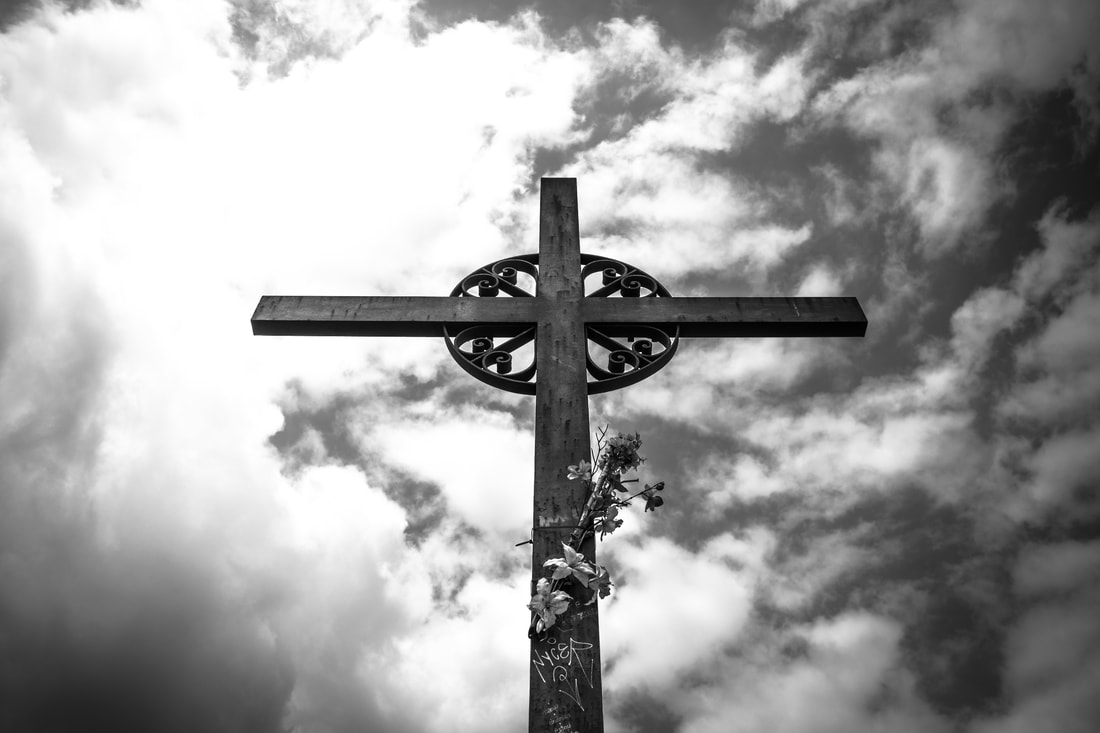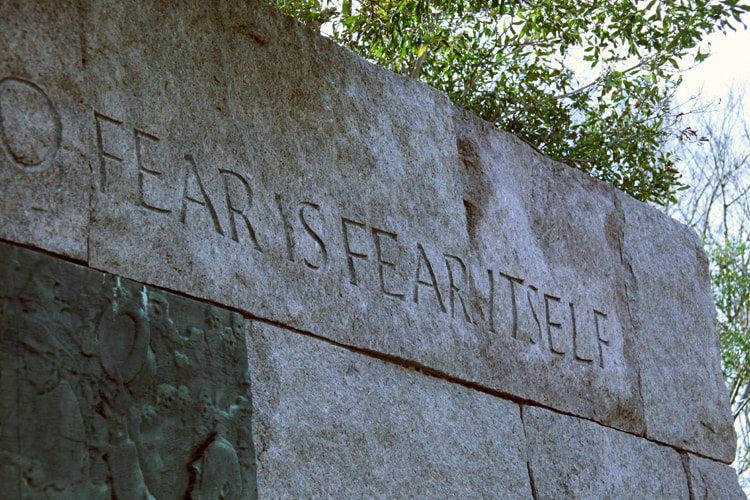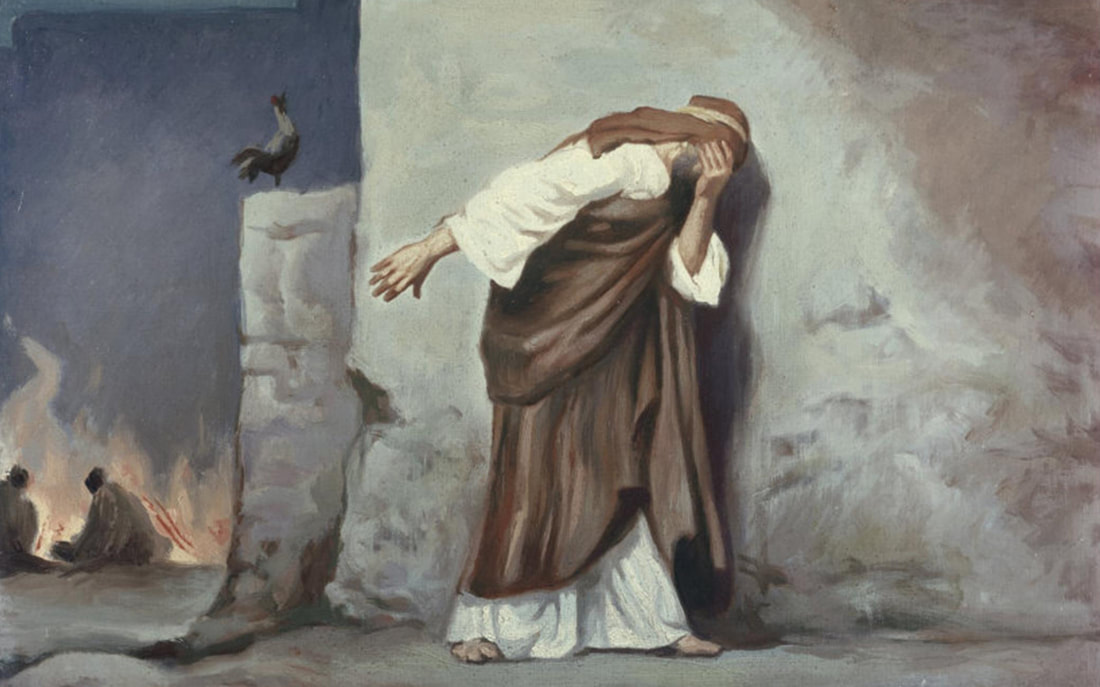Of course I understand the aversion to pharisaical moralism. Nobody, including me, wants a system that offers sacrifices and works up to God which are secretly built on foundations of injustice. I don't want my neighbor's ox to fall in a ditch on the Sabbath and refuse to help him out, or condemn a healer for healing someone on the day of rest. I don't want to pray for your hunger while doing nothing tangible to resolve it. Yet, as a moral idealist, many often think this is the type of vain offering I'm advocating, and I get it. Hopefully I can resolve that misperception of idealism and give you a new vision for the world which causes you to become an idealist too.
|
Most would call me an idealist, but not in the nice way. I'm not the loveable idealist - some pie in the sky dreamer who holds lofty aspirations that will never come to fruition. I'm the despicable idealist - the kind who refuses to advocate getting our hands dirty in order to accomplish the greater good. I advocate that one should never kill another and that one should never lie, no matter what. And that type of moral idealism just doesn't fly in the real world. I mean, look where it got Jesus?
Of course I understand the aversion to pharisaical moralism. Nobody, including me, wants a system that offers sacrifices and works up to God which are secretly built on foundations of injustice. I don't want my neighbor's ox to fall in a ditch on the Sabbath and refuse to help him out, or condemn a healer for healing someone on the day of rest. I don't want to pray for your hunger while doing nothing tangible to resolve it. Yet, as a moral idealist, many often think this is the type of vain offering I'm advocating, and I get it. Hopefully I can resolve that misperception of idealism and give you a new vision for the world which causes you to become an idealist too.
0 Comments
Photo by Mark Jason Gatus on Scopio *This is a rapid fire piece. I have so many ideas backlogged and I want to put something out each month, but I just can't bring myself to write a ton of full-length pieces. I decided to start a less formal format where I quickly lay out some thoughts I had. These pieces are often first thoughts, and should be taken with an even bigger grain of salt than pieces I've spent more time on. I despise consequentialism - the idea that the ends justify the means. Many Christians say they despise it too, but we practice this ethic all the time. My go-to example is the 2016 election of President Trump by over 80% of those in my group - conservative Christians. "He's not as bad as the other candidate!" "We can't vote third-party or abstain because a greater evil would result!" "The president isn't a pastor-in-chief, he's a commander-in-chief." "The possibility of getting supreme court justices who will ban abortion and gay marriage justifies significant moral flaws." The list could go on. The ends justified the means.
In my group's mind, justifying, overlooking, or dismissing "minor" evils like sexual assault, mysoginy, racism, denigration, mistreatment of immigrants, and all that stuff - it's all ok because even if we combined all those evils, they pale in comparison to the egregious issue of abortion. Abortion has killed tens of millions of humans in the past fifty years. One of the main problems with a consequentialist ethic is that we recognize its moral reprehensibility when we apply it to other situations. My favorite go-to example is from the book of Kings, when two mothers plan to cannibalize their children to save both of their families. From a consequentialist standpoint, murdering two kids to save two whole families sounds like the perfect moral plan. Numerically speaking, the equation is flawless. Two lives are lesser than, say, ten lives. But we recognize that such an action wouldn't be justifiable - unless, perhaps, one of the mothers was running for president. But let's take another example here - one which would lead to infinite quantities of good being achieved. If, as most non-Reformed, and many Reformed Christians believe, children who die before a certain cognitive function are elect and go to be with God when they die, then why not allow abortion and advocate for a theocracy in which all children of non-Christians (and perhaps wayward and mediocre Christians as well) are killed? Think of all the souls who would immediately experience bliss rather than the fires of hell? What is the murder of a temporal life in comparison to the saving of a soul for eternity? Of course such a thought is reprehensible because we recognize that it's evil. Regardless of the good that would be brought about - the infinite good for billions of people - we can't justify such good by participating in evil. Despite an Augustinian view one might take which justifies actions through motivations, we can't justify evil with any intent, even the best ones. What strikes me as particularly revolting about Christian consequentialism is that it is fine trading on other sins and evils for an unguaranteed "greater good," yet it refuses to trade on sins and evils for a known good. We can compromise morality in voting to obtain power which may or may not lead to the short and long-term goals we have in view, yet we refuse to embrace evil for a known infinite good we could accomplish for billions. If Christian morality includes consequentialist ethics, we're novices who are refusing to do great good. But if Christian morality doesn't include a consequentialist ethic, we're unfaithful subjects to the King who are determining good and evil for ourselves because we don't think our Lord is able to produce good results out of mere faithfulness. We have made ourselves kings, and in doing so, have exposed ourselves as fools. About 10-15 years ago, I wrote a sci-fi book focused around some ethical conundrums. It is intended to raise a lot of important questions we need to deal with considering where technology is going, but is also intended to delve into the foundation of the abortion discussion.
Photo by Watha Suteesopon on Scop.io There is perhaps nothing more central to Christian doctrine than the atonement of Jesus. Jesus is the resurrection, our promise and guarantee that we will one day be raised to new life. Paul declared that if Jesus is not raised from the dead, then we have no hope. John tells us that Jesus is the atoning sacrifice for our sins, and we know that this sacrifice is vital for our peace with God. Whether a Christian adheres to a Christus Victor model of the atonement, a ransom model, or a Penal Substitutionary model, most Christians believe that the atonement of the Christ procured some actual thing - pardon of sin, peace with God, liberation from Satan, etc.
My goal in this short essay is not to deny the idea that Jesus procured some immediate thing with his atonement. However, I do want to push back against what I believe is an extremely harmful notion many hold in regard to the death of Jesus - the notion that his death absolutely had to procure something in order to be worthwhile. Some Christians understandably want to protect the importance of Jesus and his work, and they believe that a theology such as the Moral Influence Theory of the atonement undermines the work of Jesus. This MIT declares that Jesus didn't owe Satan or God anything, but died only as a positive example for future Christians. Such a notion is abhorrent to many Christians today who believe that the MIT would take away the power, importance, and necessity of Jesus's work. While I don't adhere to the Moral Influence Theory alone, I do think that moral influence is an extremely important part of the work of Jesus. Unfortunately, because so many Christians want to protect one facet of the atonement which they think is central, they are willing to pendulum swing and deny the importance of the moral example Jesus was setting for us in his work of cross. It is my goal in the rest of this piece convince you of the importance of holding moral influence as one vital facet of your atonement theology. The book of John is among one of four gospels in the New Testament, yet it is in a class of its own. While the other three gospels, Matthew, Mark, and Luke, are considered synoptic gospels, John is quite a bit different. John frames his gospel to accentuate various teachings not highlighted as much in the other gospels, particularly the teaching of the divinity of Jesus, the Christ. We get a glimpse of this elevation and framing from the very beginning of John's gospel as we see Jesus, the Word, residing with God and creating the universe. John's gospel is filled with this elevation and emphasis on the spiritual aspect of the good news of Jesus. Whereas Luke is more the historian with his focus on eyewitness accounts and social/political defense of Jesus and the early church (see "World Upside Down" and "Interweaving Innocence" for discussions of Acts and Luke), John is more the theologian.
Perhaps one of the most beautiful theological exhibitions in the book of John is found in chapter 3. Of course we are all familiar with verse 16, but what concerns us here is not verse 16's explanation of how our salvation obtains, but rather all that precedes the securing of salvation and instead answers the question, "what is obtained in our salvation?" Verses 3-7 are of particular interest here. They say, Jesus replied, “Very truly I tell you, no one can see the kingdom of God unless they are born again.” “How can someone be born when they are old?” Nicodemus asked. “Surely they cannot enter a second time into their mother’s womb to be born!” Jesus answered, “Very truly I tell you, no one can enter the kingdom of God unless they are born of water and the Spirit. Flesh gives birth to flesh, but the Spirit[b] gives birth to spirit. You should not be surprised at my saying, ‘You[c] must be born again.’ Photo by Mariano Castro on Scopio “The Politics of Jesus” has been one of the most influential books in my life. While I could glean ten different life lessons from it to discuss right now, one in particular has surfaced in my mind as of late. In the book, John Howard Yoder, the author, points out several aspects of what it means to bear our cross. Two of these observations had never crossed my mind before. First, Yoder tells us that bearing our cross is not a random event or hardship in our lives, like cancer or a difficult boss. Instead, cross is what is borne as a direct result of the lives we lead as lived in Christ, like moving to a leper colony to serve and contracting leprosy or having your boss fire you for refusing to alter information in a report. Cross is first and foremost something borne as a direct result of living a life directed towards Calvary.
Christians, like any other group of humans, have their pet peeves. For me and my group of Christians, one of those pet peeves is the objectification of others. We recognizes that the objectification of others leads to deeper and more numerous sins, and therefore, we call it out as evil. When we elevate individualism to godhood and diminish a baby in the womb to the status of non-human - when we objectify babies - a baby who gets in our way can be killed. When sexuality and pleasure is elevated to godhood and another's body becomes a mere tool - when we objectify fellow humans for sexual gratification - then we end up with the highly exploitative and damaging pornography, sex worker, and sex-trafficking industries. Christians rightly identify Jesus's teaching that objectification is at the heart of much evil in the world. In Jesus's famous Sermon on the Mount, he declares that it isn't only murder and adultery which are evil, but the objectification of others in our hatred, anger, and lust - the latter vices being the seeds of the former. Jesus is a wise man, and we are wise to follow in his footsteps.
But just as Christians have pet peeves, we also have our pet sins. One of those pet sins is, rather coincidentally, objectifying others. Whereas my group has somehow managed not to buy into the overt acceptance and overlooking of the pleasure/sex pantheon of our culture, a different, perhaps more insidious form of idolatrous objectification has crept its way into our lives. Prosperity. Perhaps Jesus should have warned us a bit more about wealth and prosperity. Maybe he should have called it out directly or told some harsh stories about it. Maybe he should have given us some foreshadowing and foundation for the problem of prosperity in the Old Testament. Maybe he should have exiled Israel for their actions stemming from prosperous indulgence at the expense of justice towards others. Maybe if Ezekiel or some other prophet would have told us that the sin of Sodom was being guilty of idolizing prosperity - maybe that would have been enough for us not to make greed a pet sin and prosperity an idol. And perhaps if Paul had excoriated the greedy more than just a few times in the epistles, or if James, the brother of Jesus would have condemned opulence and unjust labor practices, everything would all be so clear to us now. But alas! I've always heard that it becomes much easier to understand our relationship with God after becoming a parent. I continue to find a great deal of truth in this. Right now Catalina and I have a hectic life. We have four kids under six, with two boys who are at peak craziness, and a five year old teenager. The big word running around in my mind the past few months has been obedience, because it is very clear to me that my children's obedience could significantly change how life runs right now. How do I develop obedience in my kids? If I could figure that out, it would make my life a whole lot easier. I have been thinking long and hard about how to handle my relationship with my kids, which has also begun to get me thinking about how my obedience (or disobedience) to God may have a similar appearance and patterns.
Obedience had always seemed like a cut and dry thing to me. If someone is in authority, you obey them because they said so. It's just the way it is. But as a parent, the anger which wells up inside me when my children disobey indicates to me that there is a lot more to obedience than some simple mathematical equation. When my kids straight-up look me in the eyes and disobey, I am infuriated. I have done a lot of soul searching on that, because the way I feel anger inside me is very clearly not good. It's not a righteous anger. It's a selfish anger. I recognize that in disobedience, my kids didn't merely fail a moral math equation, they offended me. Obedience is personal. Why is that? It is easy to live in fear these days. Perhaps it's always been that way. Maybe the times aren't any more fearful today, but rather humans are beings always prone to fear. Regardless of fear's source, whether in circumstances or in human nature, it's easy for those of us living in the present to see the fears which the modern world stirs up in our neighbors and in ourselves. But all this fear seems so odd in our enlightened age. One would have thought (or at least I would have thought) that a world which proclaimed itself as more "scientific," more "objective," and less "mystical" would be one in which fears would dissipate. In a world where malicious demons and capricious gods don't exist, we only have the rational world to fear. And what is there to fear in that which can be understood and controlled? The problems of modernity can be measured, assessed, and converted into probabilities. In a world where cause and effect are better understood than ever before, it seems like we should have a handle on most of our fears. Yet we find that in the Western world - the part of the world who thinks of themselves as the most advanced and scientific - fear reigns supreme. Whether you watch the news and take the temperature of the nation, whether you gather anecdotes from those in your community, or whether you simply look at rates of psychological/emotional issues and prescription drug use and drug abuse, you'll find that our world is one which is steeped in fear.
We Christians think we have the Apostle Peter pegged. Of all Jesus's disciples we seem to have the most insight into Peter's thoughts and actions. He was clearly a very eccentric individual, prone to speaking before thinking and prone to ideas of grandeur. He is the disciple who first proclaimed Jesus as the Messiah and Son of God. He is the disciple who walked on water. He is one of two disciples who raced to Christ's tomb on Easter morning. Peter was always caught up in the action. And while he so apparently loved Jesus, Peter is most well known for his betrayal of our savior during Jesus's greatest hour of need. That act of betrayal seems to fit Peter's character pretty well. He is always so close to good, but ends up falling short. Peter's betrayal was just the last example in a string of near successes, but ultimate failures. Right after being the first disciple to declare Jesus as the Messiah, Jesus told Peter to "get behind me Satan," as Peter tempted Jesus to avoid the cross. Right after being the only disciple to walk on water, he began to sink because he focused on his circumstances rather than Jesus. And right after Peter declared that he would stand by Christ, he denied him three times. Peter's story is largely a story of "almosts." He almost got it right, but always messed things up somehow.
There are many directions I'd like to go with Peter's story. I think it's awfully sad that the disciple who trusted Jesus enough to recognize him as the Messiah and to trust him to walk on water gets such a bad reputation. But what I really want to focus on is how I think the whole denial story paints Peter as something he absolutely wasn't - a coward. I want to make a case for Peter's bravery, but even more than that, I want to make the case that the underlying issue with Peter's betrayal was much deeper than momentary fear. While there may have been some fear involved in Peter's denial of Christ, I think it's fairly clear that fear for his own wellbeing was not Peter's primary problem. So why do most of us think Peter was filled with fear? I think the fear narrative is easy for us to latch on to for a number of reasons, but most of all because if we say Peter's problem was fear, we in the West can subsequently disassociate ourselves from being in Peter's shoes. How often have we felt genuine fear for our lives because of our Christian beliefs? Almost every one of us would have to say "never." And so we never have to identify with a traitorous Peter who feared for his life. But as I will argue, Peter's reason for denying Christ should make us much more introspective about the ways we are constantly tempted to deny Christ in like manner. So let me make my case now for why I don't think Peter was a coward who feared for his life. |
*The views and ideas on this site are in no way affiliated with any organization, business, or individuals we are a part of or work with. They're also not theological certainties. They're simply thinking out loud, on issues and difficulties as I process things.
Categories
All
|
||||||||||||













 RSS Feed
RSS Feed